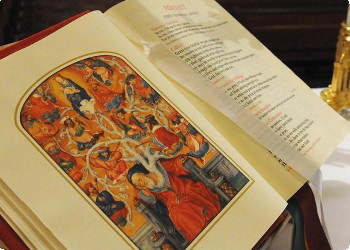YOU HAVE THE WORDS OF ETERNAL LIFE
At 9,31-42; Ps 115; Jn 6,60-69
21 APRIL
The Word of Lord Jesus is hard, in the judgment of the Jews, because it asks them for a radical conversion: from the Old Covenant they have to pass into the New, from Moses to Lord Jesus, from the Law to the Gospel, from the sacrifice of communion through the flesh of animals to the sacrifice of communion with the flesh and blood of Christ the Lord. This passage from the old religion to the new is admirably illuminated by the Letter to the Hebrews. The temptation to return to the Old Covenant was always latent.
Since the law has only a shadow of the good things to come, and not the very image of them, it can never make perfect those who come to worship by the same sacrifices that they offer continually each year. Otherwise, would not the sacrifices have ceased to be offered, since the worshipers, once cleansed, would no longer have had any consciousness of sins? But in those sacrifices there is only a yearly remembrance of sins, for it is impossible that the blood of bulls and goats take away sins. For this reason, when he came into the world, he said: “Sacrifice and offering you did not desire, but a body you prepared for me; holocausts and sin offerings you took no delight in. Then I said, ‘As is written of me in the scroll, Behold, I come to do your will, O God.'” First he says, “Sacrifices and offerings, holocausts and sin offerings, you neither desired nor delighted in.” These are offered according to the law. Then he says, “Behold, I come to do your will.” He takes away the first to establish the second. By this “will,” we have been consecrated through the offering of the body of Jesus Christ once for all. Every priest stands daily at his ministry, offering frequently those same sacrifices that can never take away sins. But this one offered one sacrifice for sins, and took his seat forever at the right hand of God; now he waits until his enemies are made his footstool. For by one offering he has made perfect forever those who are being consecrated. The holy Spirit also testifies to us, for after saying: “This is the covenant I will establish with them after those days, says the Lord: ‘I will put my laws in their hearts, and I will write them upon their minds,'” he also says: “Their sins and their evildoing I will remember no more.” Where there is forgiveness of these, there is no longer offering for sin (Heb 10,1-18).
The Jews do not welcome the Word on the bread of life and many disciples also abandon it. Jesus cannot renounce the gift of himself in the Eucharist. He would have disciples unable to live the gospel. Since the end of everything is obedience to the Gospel and without the Eucharist it is impossible to live the Word, He also asks the Apostles to show him their choice. What do they decide: remaining welcoming the mystery of the bread of life or leaving? Peter chooses to stay and gives the reasons for his choice. Faith in the Eucharist is not born of an understanding of the mystery that is beyond every created mind. It is born of the Word of Jesus. If Jesus said it, it is truth.
Since Jesus knew that his disciples were murmuring about this, he said to them, “Does this shock you? What if you were to see the Son of Man ascending to where he was before? It is the spirit that gives life, while the flesh is of no avail. The words I have spoken to you are spirit and life. But there are some of you who do not believe.” Jesus knew from the beginning the ones who would not believe and the one who would betray him. And he said, “For this reason I have told you that no one can come to me unless it is granted him by my Father.” As a result of this, many (of) his disciples returned to their former way of life and no longer accompanied him. Jesus then said to the Twelve, “Do you also want to leave?” Simon Peter answered him, “Master, to whom shall we go? You have the words of eternal life. We have come to believe and are convinced that you are the Holy One of God.”
Today, Peter gives the whole world the only rule on which faith is based: on the Word. But it is up to those who say the Word to show that He is worthy of faith. Moses attests that his Word is worthy of faith. The prophets do the same. Jesus does this with ways never existed before. Even the Apostles and every disciple of Jesus is obliged to make his person credible. Faith needs the person, because it is always welcoming the Word. The Word is of God. It is of Christ. It is of the disciple.
Virgin Mary, Mother of the Redemption, Angels and Saints always make us worthy of faith.





